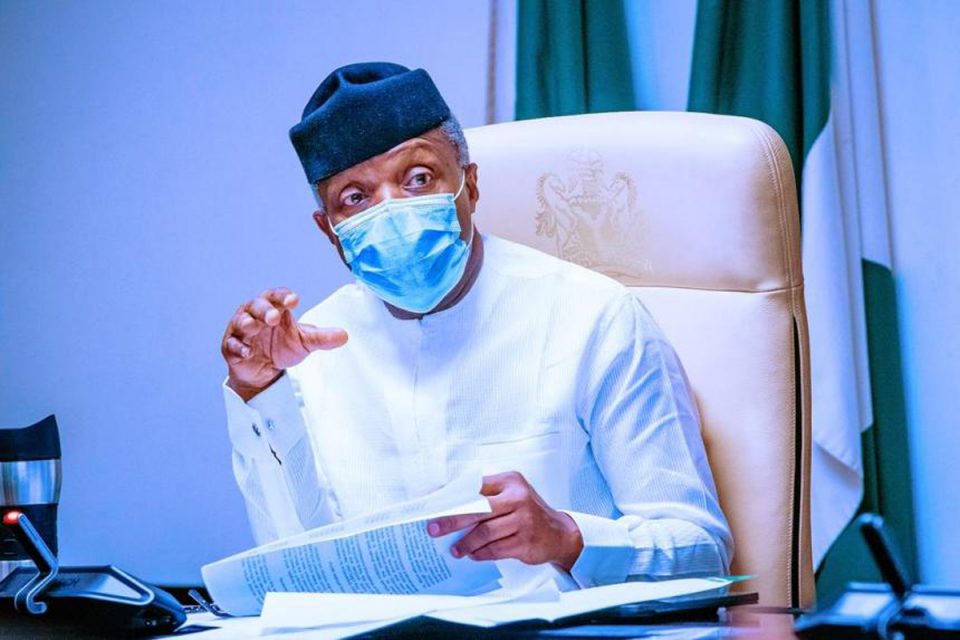Vice President Yemi Osinbajo has disclosed plans by the Federal Government to embark on a more aggressive accountability audit of various government agencies to identify bureaucratic bottlenecks and removing them in a renewed effort to further improve the country’s business environment and economy.
According to Osinbajo, the development will in turn encourage more local and foreign investments; create more jobs and opportunities for Nigerians.
He made these observations at the fifth anniversary celebration of the Presidential Enabling Business Environment Council (PEBEC), which held at the State House Banquet Hall, Abuja.
In improving the country’s business climate and making it more attractive for foreign and local investors, the Vice President noted that while creating jobs was the government’s priority, the biggest job creator was the private sector, particularly small and medium enterprises.
“We must ensure that they are not hindered from doing business easily so they can produce the opportunities our nation needs,” he stated.
While noting that in some of the agencies, the heads commit to change, but down the line the system either resists or is simply not well designed to function properly.
In such situations, the VP served notice that what must be done in the coming months, is for the FG to work with the agencies to implement a more aggressive accountability audit.
“Where we identify the specific bottlenecks in systems possibly down to the particular desks where these problems arise; we may then come for agencies and officials who have failed or resisted change,” he warned.
However, despite the challenges in some areas, the Vice President detailed how PEBEC’s reforms and efforts have been instrumental in improving Nigeria’s business environment in the last few years under the Buhari administration.
Prof. Osinbajo stated that since its inception, PEBEC has achieved the delivery of over 150 reforms and completed six National Action Plan (NAP).
He continued: “As a result, Nigeria has moved an aggregate of 39 places on the World Bank Doing Business index since 2016, and was twice named as one of the top 10 most improved economies in the world in the last three cycles. Nigeria was also named one of only two African countries to make this highly prestigious list in 2019.
“Similarly, the 2018 Subnational Doing Business report on Nigeria recorded unprecedented improvement, with 100% participation of States in the Right-of-Reply exercise. The World Economic Forum (WEF), in its 2018 Global Competitive Report, also recognized Nigeria’s business environment as one of the most entrepreneurial in the world, and highlighted Nigeria’s improved competitiveness in the enabling business environment,” the VP observed.
He affirmed that PEBEC’s reforms have proved what is possible if we are hands-on and intentional in making it easy to do business in Nigeria.
“We were fortunate to have a smart and visionary team led by Dr. Jumoke Oduwole (Special Adviser to the President on Ease of Doing Business), who, with her team of public and private sector members, designed the series of reform initiatives and internationally recognized homegrown National Action Plans (NAPs) – 60-day accelerators designed to coordinate the effective delivery of priority reforms of select Ministries, Departments and Agencies (MDAs) annually.
Also speaking, the Minister of State for Industry, Trade and Investment, Ambassador Mariam Katagum, who presented PEBEC’s 5-year empirical impact assessment book and commemorative coffee book, said the books were “in keeping faith with the Council’s tradition in documenting its activities and to employ fact-based metrics to measure the impact of its reforms.”
The Minister stated that the empirical impact assessment “was commissioned to assess the impact of reforms outlined in our National Action Plans,” adding that the commemorative coffee table book will “encourage those coming after us that, with purposeful leadership, we can achieve great feats.”
In her remarks, highlighting the achievement of the Council to promote the ease of doing business in Nigeria, Dr. Oduwole noted, “institutional reforms in the public sector were major factors in jump-starting and sustaining economic growth and development.”




